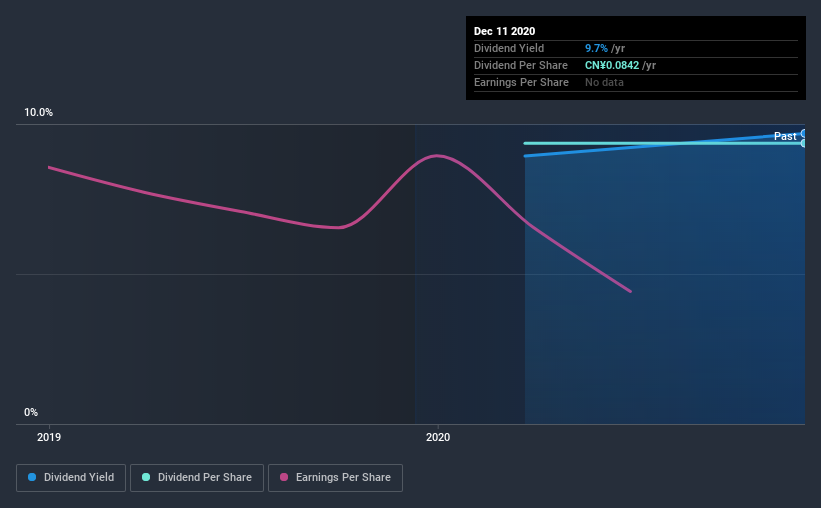- Hong Kong
- /
- Energy Services
- /
- SEHK:1921
Is Dalipal Holdings Limited (HKG:1921) An Attractive Dividend Stock?
Today we'll take a closer look at Dalipal Holdings Limited (HKG:1921) from a dividend investor's perspective. Owning a strong business and reinvesting the dividends is widely seen as an attractive way of growing your wealth. Yet sometimes, investors buy a stock for its dividend and lose money because the share price falls by more than they earned in dividend payments.
Some readers mightn't know much about Dalipal Holdings's 9.7% dividend, as it has only been paying distributions for a year or so. Some simple analysis can offer a lot of insights when buying a company for its dividend, and we'll go through this below.
Explore this interactive chart for our latest analysis on Dalipal Holdings!

Payout ratios
Dividends are usually paid out of company earnings. If a company is paying more than it earns, then the dividend might become unsustainable - hardly an ideal situation. As a result, we should always investigate whether a company can afford its dividend, measured as a percentage of a company's net income after tax. Dalipal Holdings paid out 67% of its profit as dividends, over the trailing twelve month period. A payout ratio above 50% generally implies a business is reaching maturity, although it is still possible to reinvest in the business or increase the dividend over time.
In addition to comparing dividends against profits, we should inspect whether the company generated enough cash to pay its dividend. Dalipal Holdings paid out 157% of its free cash flow last year, suggesting the dividend is poorly covered by cash flow. Paying out such a high percentage of cash flow suggests that the dividend was funded from either cash at bank or by borrowing, neither of which is desirable over the long term. While Dalipal Holdings' dividends were covered by the company's reported profits, free cash flow is somewhat more important, so it's not great to see that the company didn't generate enough cash to pay its dividend. Cash is king, as they say, and were Dalipal Holdings to repeatedly pay dividends that aren't well covered by cashflow, we would consider this a warning sign.
We update our data on Dalipal Holdings every 24 hours, so you can always get our latest analysis of its financial health, here.
Dividend Volatility
From the perspective of an income investor who wants to earn dividends for many years, there is not much point buying a stock if its dividend is regularly cut or is not reliable. This company has been paying a dividend for less than 2 years, which we think is too soon to consider it a reliable dividend stock. Its most recent annual dividend was CN¥0.08 per share.
Modest dividend growth is good to see, especially with the payments being relatively stable. However, the payment history is relatively short and we wouldn't want to rely on this dividend too much.
Dividend Growth Potential
The other half of the dividend investing equation is evaluating whether earnings per share (EPS) are growing. Over the long term, dividends need to grow at or above the rate of inflation, in order to maintain the recipient's purchasing power. Dalipal Holdings' earnings per share have fallen -38% over the past year. This is a pretty serious concern, and it would be worth investigating whether something fundamental in the business has changed - or broken. Any one year of performance can be misleading for a variety of reasons, so we wouldn't like to form any strong conclusions based on these numbers alone.
Conclusion
To summarise, shareholders should always check that Dalipal Holdings' dividends are affordable, that its dividend payments are relatively stable, and that it has decent prospects for growing its earnings and dividend. First, we think Dalipal Holdings has an acceptable payout ratio, although its dividend was not well covered by cashflow. Earnings per share have been falling, and the company has a relatively short dividend history - shorter than we like, anyway. Using these criteria, Dalipal Holdings looks quite suboptimal from a dividend investment perspective.
Investors generally tend to favour companies with a consistent, stable dividend policy as opposed to those operating an irregular one. Still, investors need to consider a host of other factors, apart from dividend payments, when analysing a company. To that end, Dalipal Holdings has 2 warning signs (and 1 which shouldn't be ignored) we think you should know about.
If you are a dividend investor, you might also want to look at our curated list of dividend stocks yielding above 3%.
If you decide to trade Dalipal Holdings, use the lowest-cost* platform that is rated #1 Overall by Barron’s, Interactive Brokers. Trade stocks, options, futures, forex, bonds and funds on 135 markets, all from a single integrated account. Promoted
New: Manage All Your Stock Portfolios in One Place
We've created the ultimate portfolio companion for stock investors, and it's free.
• Connect an unlimited number of Portfolios and see your total in one currency
• Be alerted to new Warning Signs or Risks via email or mobile
• Track the Fair Value of your stocks
This article by Simply Wall St is general in nature. It does not constitute a recommendation to buy or sell any stock, and does not take account of your objectives, or your financial situation. We aim to bring you long-term focused analysis driven by fundamental data. Note that our analysis may not factor in the latest price-sensitive company announcements or qualitative material. Simply Wall St has no position in any stocks mentioned.
*Interactive Brokers Rated Lowest Cost Broker by StockBrokers.com Annual Online Review 2020
Have feedback on this article? Concerned about the content? Get in touch with us directly. Alternatively, email editorial-team@simplywallst.com.
About SEHK:1921
Dalipal Holdings
An investment holding company, supplies application equipment for energy development in the People’s Republic of China and internationally.
Imperfect balance sheet with very low risk.
Market Insights
Community Narratives




